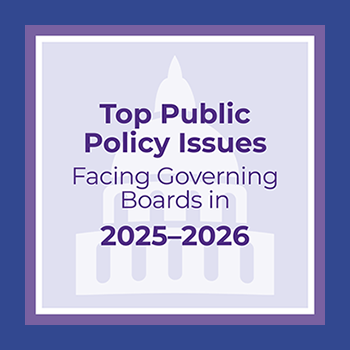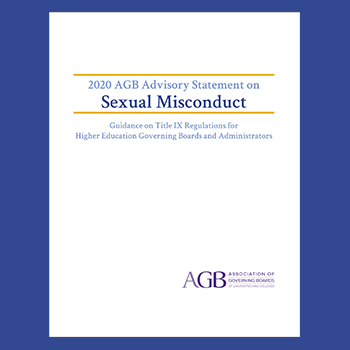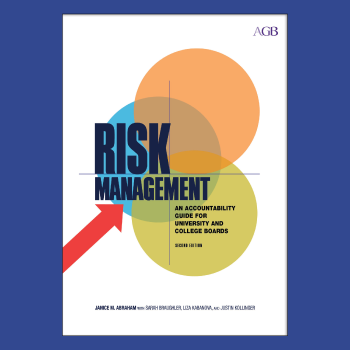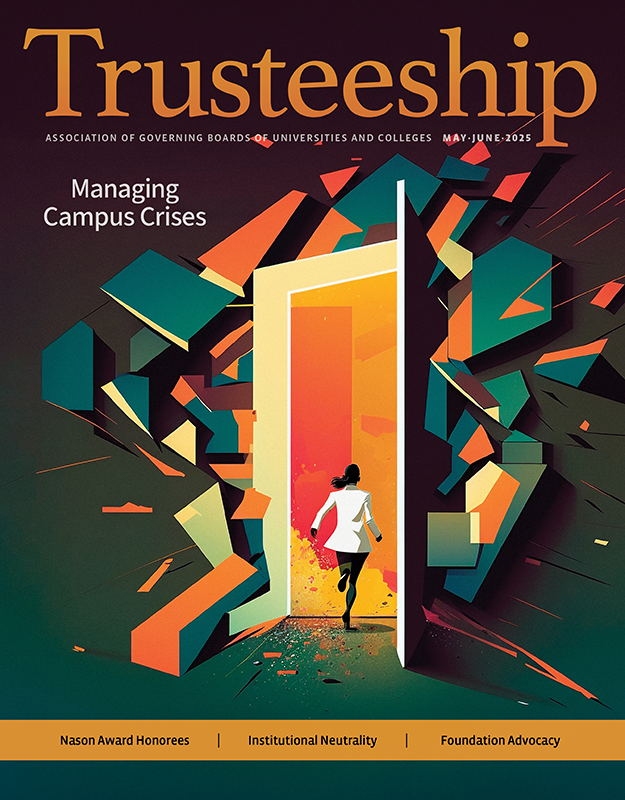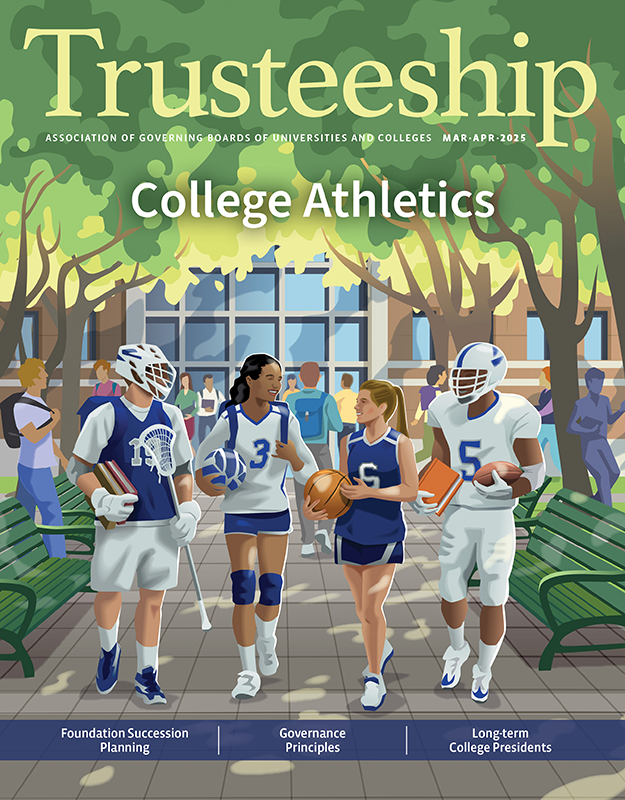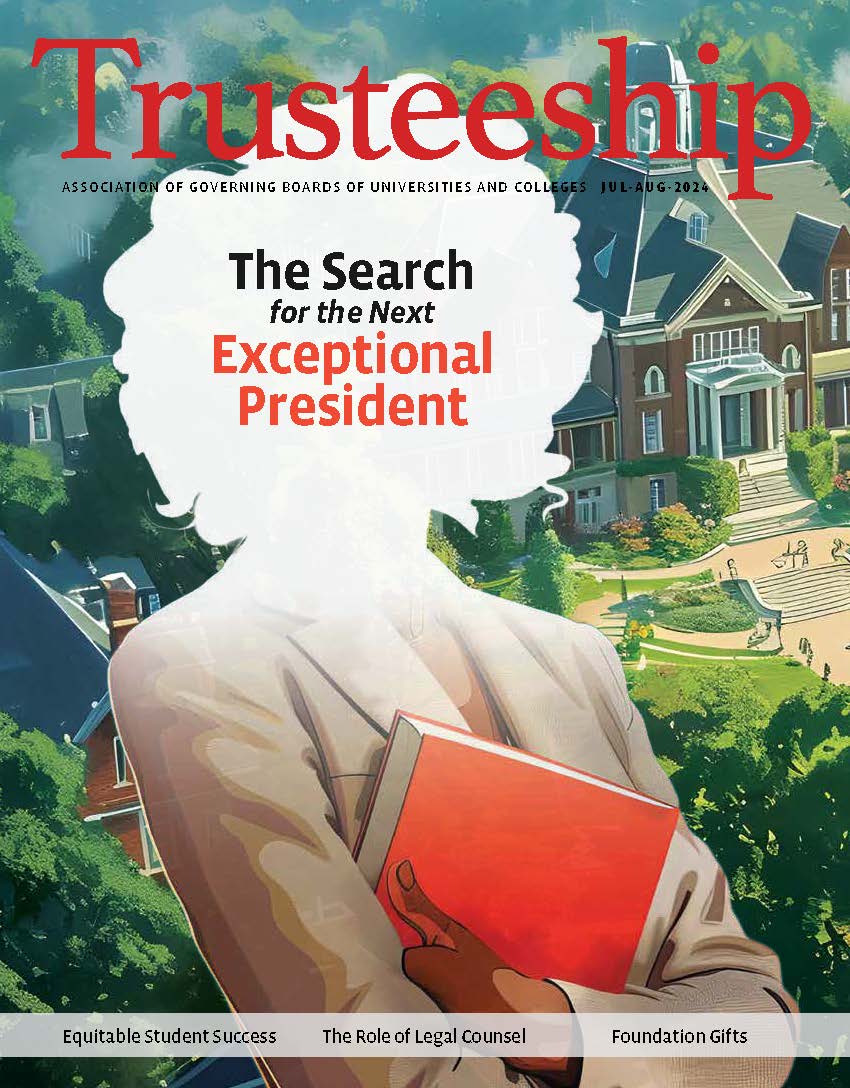Why this is important.
Governing boards have a duty to remain informed about sexual misconduct affecting their campuses and must partner with administrators to protect students. To ensure the safety and well-being of the campus community, institutions must develop a campus culture that encourages reporting and transparency, and includes clear policies, training, investigation and handling of complaints, and reporting. Governing boards must be aware of the 2020 regulations on Title IX of the Education Amendments of 1972 related to sexual discrimination and harassment and their far-reaching implications for colleges and universities.
Questions for boards.
Click below to reveal key questions for your board to consider:
Campus Safety and Culture
Consequential Questions:
- Do our board members speak out to foster a safe and inclusive environment on campus?
- Has our full board discussed legal developments and national trends regarding Title IX and sexual misconduct, specifically the new Title IX rule?
- Has our board discussed sexual misconduct and related issues (as they manifest themselves on campus and in the broader higher education community) with our institution’s administrative leadership?
Sources:
“2020 AGB Advisory Statement on Sexual Misconduct: Guidance on Title IX Regulations for Higher Education Governing Boards and Administrators,” AGB 2020
Risk Management: An Accountability Guide for University and College Boards, Second Edition by Janice M. Abraham, Sarah Braughler, Liza Kabanova, and Justin Kollinger, AGB 2020
Board Safety and Culture
Consequential Questions:
- Does our board know which administrators are primarily responsible for Title IX compliance and under what circumstances it is appropriate for the board (or appropriate board committee) to meet with those administrators?
- Has our board discussed how issues of sexual misconduct relate to the overall institutional climate?
- Has our board received sufficient information and data such that it feels it can make inquiries and have informed discussions with appropriate administrators regarding the campus culture as it relates to sexual misconduct?
- Do our institution’s sexual abuse policies apply equally to employees at all levels, and are reporting mechanisms easily accessible and well publicized to the community?
Sources:
“2020 AGB Advisory Statement on Sexual Misconduct: Guidance on Title IX Regulations for Higher Education Governing Boards and Administrators,” AGB 2020
Risk Management: An Accountability Guide for University and College Boards, Second Edition by Janice M. Abraham, Sarah Braughler, Liza Kabanova, and Justin Kollinger, AGB 2020
Processes and Policies
Consequential Questions:
- When did our board last review our institution’s policies regarding sexual misconduct and discuss the implementation by appropriate administrators? How often should the board do so?
- Has our institution maintained a Title IX coordinator and devoted appropriate resources to carrying out that function?
- Does our institution comply with the Violence Against Women Act-Campus SaVE Act amendments to the Clery Act related to sexual violence and intimate partner violence?
Sources:
“2020 AGB Advisory Statement on Sexual Misconduct: Guidance on Title IX Regulations for Higher Education Governing Boards and Administrators,” AGB 2020
Risk Management: An Accountability Guide for University and College Boards, Second Edition by Janice M. Abraham, Sarah Braughler, Liza Kabanova, and Justin Kollinger, AGB 2020
Recommended resources.
We carefully curated these staff-picked resources for you:
2020 AGB Advisory Statement on Sexual Misconduct
July 20, 2020
AGB
Risk Management: An Accountability Guide for University and College Boards
Second Edition
2020
Janice M. Abraham with Sarah Braughler, Liza Kabanova, Justin Kollinger
Title IX Changes- What Board Members Need to Know
Webinar On Demand
Presented by Alex Nock, Jon Alger, Amy Foerster, and Kevin Kruger
Failure to Act Is Not an Option
Trusteeship magazine, May/June 2022
By Janice M. Abraham
Top Five Lessons Learned from Implementing the 2020 Title IX Regulations
Webinar On Demand
Presented by Leah Gutknecht and Daniel A. Swinton


